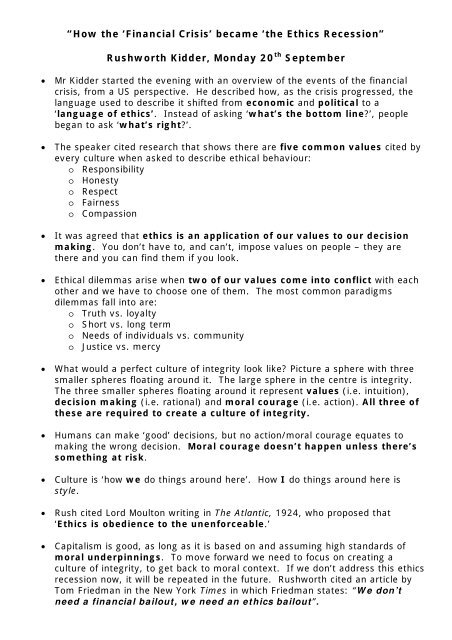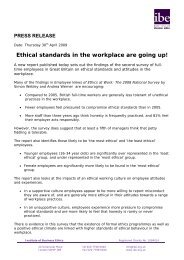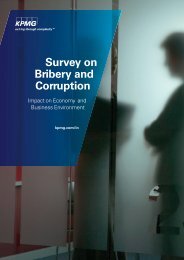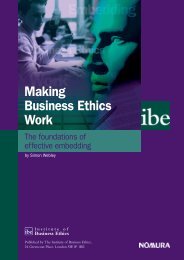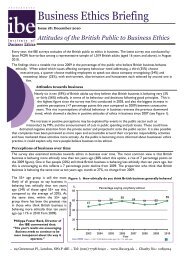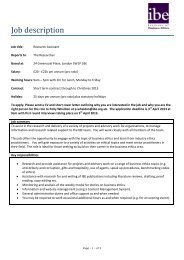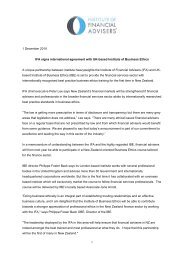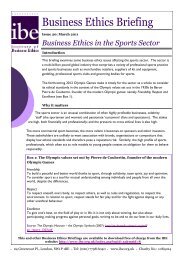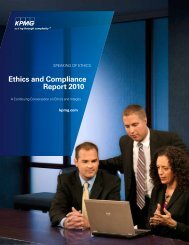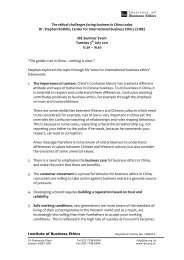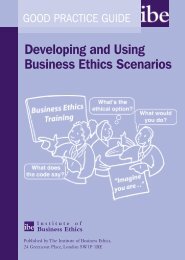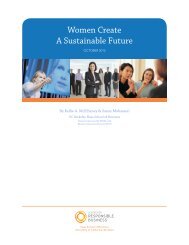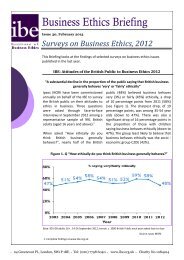âHow the 'Financial Crisis' became 'the Ethics Recession ...
âHow the 'Financial Crisis' became 'the Ethics Recession ...
âHow the 'Financial Crisis' became 'the Ethics Recession ...
You also want an ePaper? Increase the reach of your titles
YUMPU automatically turns print PDFs into web optimized ePapers that Google loves.
“How <strong>the</strong> ‘Financial Crisis’ <strong>became</strong> ‘<strong>the</strong> <strong>Ethics</strong> <strong>Recession</strong>”<br />
Rushworth Kidder, Monday 20 th September<br />
<br />
<br />
<br />
<br />
<br />
<br />
<br />
<br />
<br />
Mr Kidder started <strong>the</strong> evening with an overview of <strong>the</strong> events of <strong>the</strong> financial<br />
crisis, from a US perspective. He described how, as <strong>the</strong> crisis progressed, <strong>the</strong><br />
language used to describe it shifted from economic and political to a<br />
‘language of ethics’. Instead of asking ‘what’s <strong>the</strong> bottom line?’, people<br />
began to ask ‘what’s right?’.<br />
The speaker cited research that shows <strong>the</strong>re are five common values cited by<br />
every culture when asked to describe ethical behaviour:<br />
o Responsibility<br />
o Honesty<br />
o Respect<br />
o Fairness<br />
o Compassion<br />
It was agreed that ethics is an application of our values to our decision<br />
making. You don’t have to, and can’t, impose values on people – <strong>the</strong>y are<br />
<strong>the</strong>re and you can find <strong>the</strong>m if you look.<br />
Ethical dilemmas arise when two of our values come into conflict with each<br />
o<strong>the</strong>r and we have to choose one of <strong>the</strong>m. The most common paradigms<br />
dilemmas fall into are:<br />
o Truth vs. loyalty<br />
o Short vs. long term<br />
o Needs of individuals vs. community<br />
o Justice vs. mercy<br />
What would a perfect culture of integrity look like? Picture a sphere with three<br />
smaller spheres floating around it. The large sphere in <strong>the</strong> centre is integrity.<br />
The three smaller spheres floating around it represent values (i.e. intuition),<br />
decision making (i.e. rational) and moral courage (i.e. action). All three of<br />
<strong>the</strong>se are required to create a culture of integrity.<br />
Humans can make ‘good’ decisions, but no action/moral courage equates to<br />
making <strong>the</strong> wrong decision. Moral courage doesn’t happen unless <strong>the</strong>re’s<br />
something at risk.<br />
Culture is ‘how we do things around here’. How I do things around here is<br />
style.<br />
Rush cited Lord Moulton writing in The Atlantic, 1924, who proposed that<br />
‘<strong>Ethics</strong> is obedience to <strong>the</strong> unenforceable.’<br />
Capitalism is good, as long as it is based on and assuming high standards of<br />
moral underpinnings. To move forward we need to focus on creating a<br />
culture of integrity, to get back to moral context. If we don’t address this ethics<br />
recession now, it will be repeated in <strong>the</strong> future. Rushworth cited an article by<br />
Tom Friedman in <strong>the</strong> New York Times in which Friedman states: “We don’t<br />
need a financial bailout, we need an ethics bailout”.
Increasing regulation is not <strong>the</strong> answer. Not only can ethics not be<br />
regulated, but think about who you’re trying to regulate – some of <strong>the</strong><br />
“smartest people in <strong>the</strong> room” to use a phrase from Enron.<br />
A series of Q&A followed in which <strong>the</strong> following topics were addressed:<br />
<br />
<br />
<br />
<br />
<br />
<br />
<br />
<br />
<br />
The distinction between different ‘sets’ of ethics: personal society ethics,<br />
company ethics and financial ethics. It was suggested that some have got<br />
worse than o<strong>the</strong>rs.<br />
The impact of technology on our morals. It creates a ‘remoteness’ to <strong>the</strong><br />
situation and increases <strong>the</strong> speed at which we can operate.<br />
Does an ethics oath really translate into an admission of failure on behalf of <strong>the</strong><br />
business schools?<br />
Culture emulates family life; when children violate <strong>the</strong> trust of <strong>the</strong>ir parents,<br />
rules come in.<br />
When companies pay a fine but don’t admit that <strong>the</strong>y’ve done anything wrong;<br />
is this a reflection of poor ethics?<br />
Methods for raising ethical sensitivity were discussed.<br />
Will <strong>the</strong> BRICs repeat our mistakes? The key ethics issue in <strong>the</strong>se markets is<br />
corruption. This needs to be eradicated first.<br />
The effect that one good role model has; it always triumphs over bad. It<br />
parallels <strong>the</strong> relationship between light and dark – why does light always<br />
triumph over darkness?<br />
What if bad is <strong>the</strong> absence of good? We’re accustomed to thinking in opposites.


